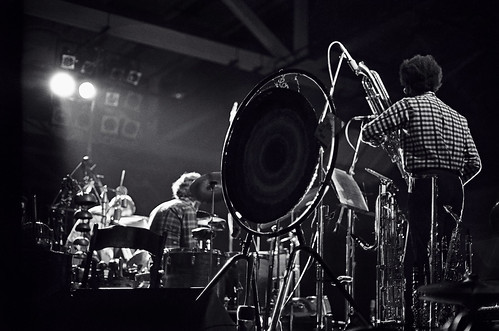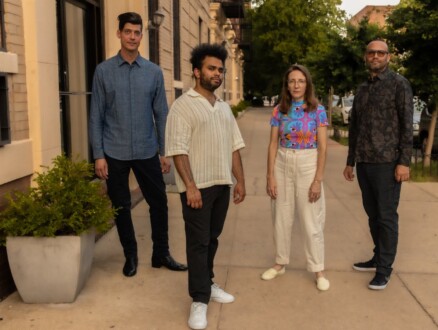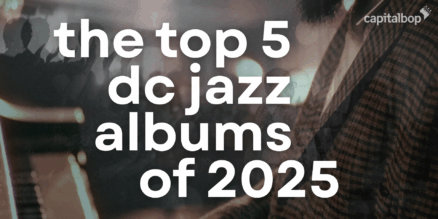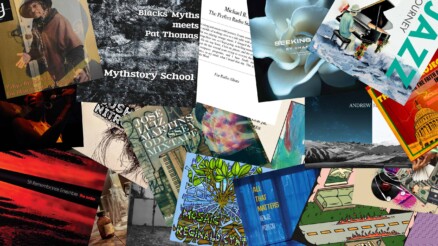Interviews | Taylor Ho Bynum and Mary Halvorson on the myth and music of Anthony Braxton


Words to describe Anthony Braxton’s music: challenging, difficult, weird, original, beautiful. Perhaps more than any living American composer, Braxton’s work has been extremely controversial without being overtly political. In fact, he has no interest in placing his music within the confines of any political or racial discussion. Nor does he associate his music with a particular genre. He simply aims to create music that is personal, and unique.
Since the late 1960s, Braxton’s musical output has been nothing less than prolific. He was one of the main progenitors of the AACM in Chicago, where he developed alongside some of the most innovative and celebrated American creative musicians. He was awarded with a major label contract in the 1970s, giving him the opportunity to present his radical music to an international audience. However, for every loyal fan he made, his music also became associated with an esoteric other, seeming far too strange for mainstream society.
After his stint as an international creative music star, he began a career as an academic, where his ideas and concepts in composition and improvisation could be refined and developed further. More importantly, he has had the opportunity to mentor multiple generations of innovative improvisers. Through his professorial position, he simultaneously receives inspiration and information from his students, as he provides them with a wealth of knowledge and insight.
This Saturday, Braxton will perform with his Diamond Curtain Wall Quartet, featuring the pianist Jason Moran as a special guest. I got in touch with two members of the group, both prominent Braxton protégés: the cornetist Taylor Ho Bynum and the guitiarist Mary Halvorson, who led her own group at the Atlas Performing Arts Center last night. They talked about working with the master and what it has taught them.
CapitalBop: How did you become a member of Anthony Braxton’s band?
Taylor Ho Bynum: I studied with him when I was an undergraduate at Wesleyan University in the mid-’90s. Then after I graduated, he had me on a couple of his gigs. We actually played in D.C. once before, at the Library of Congress back in 1998. That concert was recorded and is out now on Braxton House Records.

Then I moved to Boston. I felt like he was such a huge influence on me that I actually needed to get away and work with other musicians and establish my own identity a little bit. So I spent about five years working in Boston and in New York. Then I reconnected with him when we made a duo record in 2002, and then joined one of his touring bands in 2004. Since then I’ve been pretty intimately involved with him on a majority of his projects.
Mary Halvorson: I met Anthony Braxton when I was a freshman at Wesleyan University, where he teaches. I took a couple of classes with him during my first semester, which I found incredibly inspiring – so much so that by the end of the semester I had dropped my planned science major. The intricacy, creativity and depth of his concepts were overwhelming to me at the time, but I was hooked. I spent the next three years taking as many of his classes as I could. He was a great teacher with an infectious positivity who was always encouraging his students to explore and take risks. He opened me up to a whole new musical universe.
During the three years I was at Wesleyan I worked closely with him, performing in his large and small student ensembles, learning his musical systems and compositions. A couple years after I graduated – this was probably 2004 – he was putting together a band for a European tour and asked me to be a part of it, and we have been working together ever since.
CB: How has he affected your music?
THB: He has a profound influence. I try very hard in my own work to make sure it doesn’t sound like Anthony. Why would I need to? [laughs] He is one of the best kinds of teachers and mentors, in that he encourages all of us that work with him to explore our own interests rather than replicate what he does.
He’s such a brilliant thinker about music. His ideas and concepts have become core to my DNA as a composer and performer and improviser. He has such a brilliant way of clearly structuring composition and improvisation and musical ideas, and doing it in a modular way so that it is never fixed. It’s always exciting and fresh. Always changing and evolving. Every gig we do he brings something new. That’s extraordinary, to have someone who never takes a creative vacation, always pushing. So in that sense he has a profound influence.
Then as a player, getting the chance to work with him in a small ensemble, working with a virtuoso performer/improviser, forces you to raise the bar. I remember the first time I did a gig with him. It was around 1997 or 1998 at the Knitting Factory in New York. It was a quartet concert. Anthony took this saxophone solo that just tears the paint off the walls. And then I look around and I realize I have to go next. [laughs] It’s a terrifying feeling, but it’s the kind of challenge you need to get as a musician. You always want to be a little in over your head and be challenged to get better, and Anthony always presents that challenge.
MH: I don’t think I would be a musician today if it weren’t for Anthony’s support and encouragement. A lot of my drive toward experimentation comes directly from his concepts. His imagination and creativity know no bounds, and I am always inspired to be around him and play his music. At the same time, I try to make sure my music is very different from his; there is only one Anthony Braxton! He has always encouraged his students to be themselves, and that’s what I try to do.
CB: Anthony Braxton was the first AACM artist to receive a record deal with a major international label (Arista). What do you see are the effects of that period in the greater question of how major labels deal with experimental music?
THB: It might have been the last hurrah for experimental music. I love the fact that Anthony gets the deal with Arista, and he does the quartet album like they wanted, and he does the big band music album like they wanted. Then he wants to do his three-orchestra composition now. And it leads to something totally uncompromising and un-commercial. I don’t think Arista ever put out a less commercial recording than Braxton’s three-orchestras piece.

What I love about Anthony and his level of musical integrity is that he was signed to a major label but it really didn’t affect his choices at all. He didn’t go out and make a bossa nova record or anything. He just did his stuff. I think this proved both to Braxton himself and the experimental music scene, and the major label scene, that maybe this isn’t a fit that is going to work. For his own career it was important because it got his music out to a much wider audience. It also plays to the realization that ultimately, for those of us interested in making music for noncommercial purposes, and doing something different, we shouldn’t depend upon the music industry to support us. We have to go and do it ourselves. The real legacy of the AACM and Anthony is the legacy of artists taking control of their own work, finding their own way to produce it, and not having to compromise for commercial interests.
CB: What do you think were the effects of this on the audience?
THB: I think it shows that to understand the approach to experimental music, it’s not about it being shoved down people’s throats. Anthony uses the term for his listeners’ “friendly experiences.” It says a lot because it is the idea that you want to go into the experience with an open mind, as a friend. Not going in as a bitter consumer, but as a friend. I think the most challenging music expects more from the audience. It’s asking the listener to actively engage in the process. I think that’s why it is so potentially powerful, and potentially off-putting.
Most people want music to put on in the background while cooking dinner and chatting with their friends. You can’t do that with this kind of music. This is music that demands your attention and engagement. Because of that, ultimately it offers a real transcending experience. It offers a chance to think about structure and form in a completely different way. In that sense, an engagement in creative music is asking the listener to be creative. The listener has a responsibility that not everyone wants to take, especially if you are putting on the new Top 40 record. And that’s okay, there’s a role for that and all types of music. What worries me sometimes in the culture these days is that the role for music that actually challenges and enlightens the audience is being pushed to the sidelines. But that’s why we do this, to engage in a dialogue with our listeners.
CB: Mr. Braxton experienced the split in the avant-garde between “free jazz” and “free improvisation.” Could you explain the reasons behind this split, and what are your thoughts on the split?
THB: At its best, music is just music. Creative musicians from everywhere can work with each other in a productive way. My friend Joe Morris just wrote a book where he called it “free music.” I think he talks about recognizing that all these different musics are systemic processes of approaching improvised music, but all coming back to the same source.
I think part of it might come from the movement in Europe where they wanted to establish their own identity, rather than being “jazz” music. That’s happened in the U.S., too. “Jazz” is a very loaded word in a lot of ways. There’s Nicholas [Payton’s] argument that he’s taken recently – the derogatory and etymological issues with the word “jazz”. Whatever your feelings on that, it becomes defined in a certain way. If you use the word “jazz” people have certain expectations, from Wynton Marsalis to Kenny G. That’s the spectrum of what mainstream America’s conception of jazz is. So if you are doing something outside of that, you often have to struggle to find a different way to term it.
Even though at the same time, my heroes are Duke Ellington, Miles Davis, and John Coltrane. These are people that obviously were huge inspirations for all of us. So we don’t want to shy away from that legacy and continuum, but try to embrace the creative process of that continuum rather than trying to replicate what those artists made as a product. It’s the inspiration of their personal musical and spiritual processes that lead them to create new work. It’s tricky because all the terms for me end up defining the music, and I like to have my music as undefined as possible. Anthony has a great term that he uses; he calls it “trans-idomatic music.” It acknowledges and celebrates idiom and genre in all of its forms, yet draws from those idioms and genres in search of something new, as opposed to being limited by what the definitions of those genres are. There’s been so much extraordinary music that’s happened under all sorts of different labels, how can you drop from all of that and be deeply inspired by it and yet make something that is individual and unique? And do it in a way that’s not kitschy or referential? How do I take those lessons and turn them into something personal?
CB: This is Braxton’s second performance at the Kennedy Center. He is one of the most important African-American composers and musicians in the avant-garde, or otherwise; what do you think are the implications of this momentous performance in the current musical landscape of 2012?
THB: I think it’s so important because it’s frustrating, I think for all of us who are involved in what we see as very American music, how rarely we perform in the U.S. I perform about twice as much in Europe as I do in the States, and Braxton probably performs about 10 times as much in Europe as he does in the States. But he very proudly proclaims his music as American music, and a product of his American experience. It’s just frustrating because there’s less support of the arts in the U.S. and less of an embrace of an avant-garde culture here, that we don’t get to work at home as much. It’s not to say that there’s not an audience for it. When I go out and play in the U.S., people really respond to this. There’s just not the access. So for somebody like Anthony, who is one of the most important American musicians of the past 50 years, he should have a chance to perform at the Kennedy Center. I do give Jason Moran credit for this. This is his first year curating the concert series there, and I know it was a priority for him to bring in Anthony. So I’m really quite excited about it.
MH: I am thrilled about the Kennedy Center performance. Anthony is such an amazing artist and innovator, one who deserves to be heard by as many people as possible. Also, I am very happy that Jason Moran is curating. It is rare that Anthony does performances in the States these days, and Jason recognized that, as well as the potential for Anthony’s music to reach new audiences. It will be great having Jason perform with the band as well; he is a brilliant pianist with a real depth of influences. I am looking forward to hearing his take on the music. This will definitely be a unique performance.
CB: What are some of the most interesting things you see about performing for the Washington, D.C. audience?
THB: I love playing in D.C. It’s a really warm audience. I think it’s interesting because it is one of the more diverse audiences I see in the States. There’s a strong African-American community and a strong Asian-American community. And that’s representative in the music. I’ve never played the Kennedy Center, so I don’t know how its gonna be. And again, I think it says something to present Anthony’s music there. One of the things I love about Anthony’s work is that it has ramifications beyond music. He’s incredibly innovative about ideas of structure. It especially sets up a functioning multi-hierarchical sort of utopian democracy in a way. In his ensemble, the musicians have an incredible amount of ability to make choices about where the music goes. Even though Anthony is the clear leader and composer of the system, there’s no other system I can work with as an individual where I can express my own individuality. I can function as a bandleader within Anthony’s band. I can function as a composer within Anthony’s compositions. It sets up a model for organizational structure. I currently work with a non-profit organization in Connecticut dealing with criminal justice reform. For me it’s been very inspiring how quickly the musical principles that I’ve inherited from Anthony translate into trying to set up a social justice organization. Because there you want to simultaneously provide organizational structure and support and a shared philosophical goal, yet provide agency and empowerment to all the different individuals working on a shared cause without having to limit their personal innovation or initiative. It’s amazing how directly applicable the lessons I’ve learned [are]. So presenting this music, Anthony’s creativity, to the home of a dysfunctional political system, there’s a very exciting possibility there.
MH: It’s an unknown, and to me that in itself is interesting. I’m sure there will be many Anthony Braxton fans present, and many new listeners as well. Listening to Anthony’s music is such an individualistic experience, so from the audience point of view I hope we will be able to inspire, challenge, and/or present something entirely new.
—
Anthony Braxton performs on Saturday. More information is available here. Tickets cost $38, and can be purchased here.
Anthony Braxton, DC, DC jazz, jazz, Mary Halvorson, Taylor Ho Bynum, Washington


